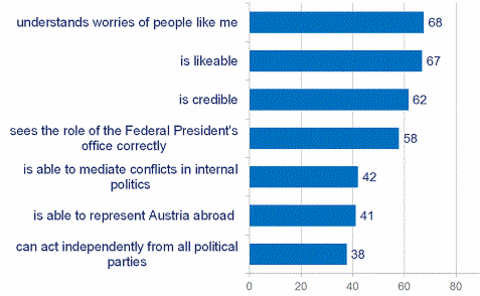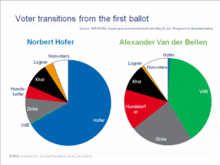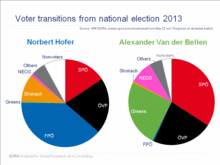
Die Seite www.foresight.at ist gerade im Aufbau. Diese Seite (sora.at) wird nicht mehr gewartet und im Frühjahr 2024 vom Netz genommen.
Elections of the Federal President
of the Republic of Austria 2016: 2nd ballot

- Voting motives for Norbert Hofer
The ORF/SORA/ISA election day survey among 1.222 eligible voters shows which motives moved voters in this election.
Dissatisfaction with politics, but no dramatic angst syndrome about the future
The first ballot of this Presidential election was marked by a strong dissatisfaction with the federal government and general anger and disappointment about politics.
Austrian’s expectations about the future are not so pessimistic, on the other hand:
- 27% expect a decreasing quality of life over the next years
- 21% expect a positive trend
- And a majority expects neither improvement nor decrease in the quality of life in the coming years.
Voting motives for Norbert Hofer
About 2,2 million Austrians voted for Hofer in this election, for various motives:
Clearly, Norbert Hofer was successful mobilizing the votes of those fearing a decreasing quality of life in the future. 67% of those expecting a negative development of Austria voted for Hofer.
Hofer also convinced voters as a person: 68% of his voters said it was very important for their vote choice that Hofer “understands the worries of people like me"; for 67% it was decisive that Hofer is a “likeable” person.
On the other hand, about one third (31%) of his voters said they voted for Hofer mainly to prevent his opponent from winning.
Voting motives for Alexander Van der Bellen
The voting motive of preventing the opponent’s victory was even stronger for Alexander Van der Bellen, i.e. 48% said they voted for him for this reason.
Other than Hofer, Van der Bellen was mainly supported by persons expecting Austria’s quality of life to remain constant or to improve.
Further voting motives were the belief that Van der Bellen would be a better “representative of Austria abroad” (66%) and that he would see the office of the Federal President the way it should be (62%).
Ambivalent expectations from the future President
The ORF/SORA/ISA election day survey asked respondents about their view on two opposing statements concerning the President’s political role:
- “The Federal President always has to subordinate his ideas to the majority in parliament”
- “Austria needs a strong President who tells the government and the parliament what to do”
Overall, the survey shows mixed feelings in the population about this issue, i.e. both statements found agreement among a slight majority.
Among Hofer-voters, 77% agreed with the first statement (“strong President”), 45% with the second.
Van der Bellen voters rather prefer the subordination of the President to the majority in parliament (71% agree), while 43% agree with the role of a “strong President”.
Voting behaviour by population groups
Each candidate in this runoff mobilised more than 2 million votes and hence their supporters come from all population groups.
Of these, 19% (Hofer voters) and 36% (Van der Bellen voters) say that they voted for a Freedom Party / Green candidate for the first time.
Strong gender differences
Strong gender differences marked already the first ballot in this Presidential election.
If only women had voted in the runoff, Van der Bellen would have won with 60%, if only men had voted, Norbert Hofer would have received 60%.
Differences by age: Van der Bellen mobilised young women
Alexander Van der Bellen received 54% of the vote among 16-29 year-olds, especially young women voted for him (young men voted rather for Hofer).
Hofer received his best result (63%) among men aged 30-59.
Voting behaviour by formal education
Austrians with high shool diploma or tertiary education voted rather for Alexander Van der Bellen (76%).
Among Austrians without high school diploma on the other hand, Norbert Hofer received 62% of the vote.
Voter transition analysis
SORA analysed voter transition from the first ballot as well as from the national election 2013. Main trends are:
- Both candidates were able to mobilize almost all of their supporters from the first ballot again. Also, most Green and Freedom Party voters from the national election 2013 went to the urns for their respective candidate in this runoff.
- Alexander Van der Bellen mobilized 208.000 non-voters from the first ballot, , Norbert Hofer 129.000.
- Supporters of Irmgard Griss mostly voted for Van der Bellen (515.000, i.e 64% of the Griss votes); only 10% abstained from voting.
- 69% of the Hundstorfer-voters decided for Van der Bellen (334.000 votes).
- Voters of Andreas Khol distributed more evenly among both candidates. This is also true for People's Party voters from the national election 2013.


